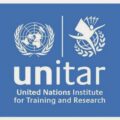Training Assistant
JOB DETAIL
UNITAR Chemicals and Waste Management (CWM) Programme Unit has a number of key project activities in a wide range of programme areas requiring assistance based in Geneva, including but not limited to: PRTR, GHS, mercury, e-waste, waste management, and support for the ratification of BRS and Minamata Conventions. Activities are carried out through partnerships with other UN organizations, bilateral development partners and project countries, as well as leading learning institutions and other, relevant organisations.
Chemicals and waste management, project coordination
The Training Assistant will support the activities under the following programme areas: plastics management, waste management, PCBs management, support to the ratification of the Chemical-related MEAs, Pollutant Release and Transfer Registers, the GHS, chemical safety programmes, and online courses. The Training Assistant will assist with project monitoring and supervision as well as the development of training materials and tools. The Training Assistant will also assist with project development and resource mobilization activities for the overall CWM Programme.
Under the supervision of the Senior Programme Specialist of the Chemicals and Waste Management Programme Unit, the incumbent will:
- Support countries to develop information exchange mechanisms and reporting schemes for Chemicals and Waste Management by:
- Participating at international meetings and workshops on PRTRs, GHS, Waste Management, Mercury, POPs and Global Framework on Chemicals (GFC);
- Supporting UNITAR’s lead role on PRTR and coordinating actions with key partners including OECD and UNECE;
- Supporting the coordination of Global Framework of Chemicals related activities;
- Supporting the mercury, waste management, e-waste and Green and Sustainable Chemistry related activities, attending workshops and working with key international organizations to develop a global GSC platform and materials;
- Assist the coordination of waste management (including e-waste and plastic) initiatives by:
- Identifying potential areas of cooperation between the e-waste and waste management and other UNITAR CWM programme areas;
- Organizing training events on e-waste, GSC, mercury, GHS, GFC and waste management;
- Exploring possibilities to further work in partnership with relevant secretariats and UN organizations and GEF;
- Assisting in the development of supporting documents, materials and e-learning modules to facilitate the work of national and international partners.
- Support countries in their efforts to ratify the Chemicals and Waste-related MEAs by:
- Assisting the coordination of activities related to the ratification of Chemicals and Waste related MEAs in countries;
- Identifying relevant experts and coordinating with them on actions and activities in support of national ratification;
- Coordinating with relevant Secretariats (BRS and Minamata) the development of technical interventions.
- Identify potential areas of cooperation with key partners and develop proposals;
- Providing support to internal and external Programme reporting and evaluation; and
- Supporting the Programme with other tasks, as required by the Senior Programme Specialist of the Chemicals and Waste Management Programme.
- Support the development of a Global Framework on Chemicals activities and strategies by:
- Supporting the development of a UNITAR strategy and plan to support the various aspects of GFC implementation;
- Working with senior experts in contributing to the plan and finalize the plan for internal use and monitoring.
- Support effective project planning, management and administration by:
- Supporting the organization of national, global and regional meetings and workshops;
- Identify potential areas of cooperation with key partners and develop proposals;
- Providing support to internal and external Programme reporting and evaluation; and
- Supporting the Programme with other tasks, as required by the Senior Programme Specialist of the Chemicals and Waste Management Programme.
- At least one agreement of cooperation with a country or UN organization;
- At least one project on any aspect of chemicals and waste management completed;
- One project completed on early implementation of the BRS+M conventions;
- 3-5 other projects successfully managed, including timely delivery and reporting and positive feedback from clients;
- Partnership with an instructional design team/company for the development of waste management modules;
Professionalism – Good understanding and knowledge in the field of Chemicals and Waste management, particularly sound management of waste, e-waste and information exchange mechanisms; understanding e-learning principles; training and facilitation skills, practical experience in programme/project management and administration; good research, analytical and problem-solving skills, including ability to identify and participate in the resolution of issues/problems; familiarity with and experience in the use of various research methodologies and sources, including electronic sources on the internet, intranet and other databases; takes responsibility for incorporating gender perspectives and ensuring the equal participation of women and men in all areas of work.
Planning & organizing – Sound organizational skills and ability to prioritize own work programme, delivering results and quality work, including when working under pressure; efficient, reliable and conscientious.
Communications – Excellent verbal communication skills. The ability to draft/edit a variety of written reports, reports, training materials, studies and other communications and to articulate ideas in a clear, concise style.
Technology – Proficient computer skills and use of relevant software and other applications, e.g. word processing, graphics software, spreadsheets and other statistical applications, Internet, etc
Teamwork – Strong interpersonal skills; ability to deal effectively with multiple constituencies and to establish and maintain effective working relations in a multi-cultural, multi-ethnic environment with sensitivity and respect for diversity.

